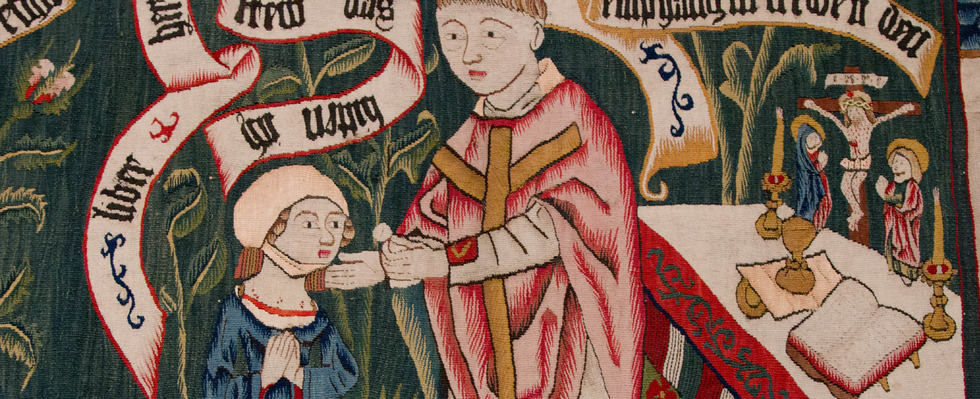In Defence of Frequent Communion
“This supernatural bread and this consecrated chalice are for the health and salvation of mankind” St Cyprian, bishop of Carthage, third century
Follow the money. The movie Fifty Shades of Grey grossed $76m in its opening weekend. That was in the United States alone. In 56 other countries, including the United Kingdom, it also topped the box office charts. The film is produced by Universal Pictures. Universal is owned by Comcast, the largest broadcasting and cable company in the world by revenue. Last year the firm’s chief executive, Brian Roberts, received a pay packet worth nearly $41m.
What’s the lesson? That for many big corporations the bottom line is the bottom line. Nothing more. Nothing else. As Pope Francis says in his robust critique of modern-day political economy, “unbridled capitalism” often promotes a “logic of profit at any cost” and “exploitation without looking at the person”. This is most obvious in the recent rise and rise of pornography, an “industry” that now grosses an estimated $97bn a year worldwide.
There was a time when a family could metaphorically and literally bolt the front door to shelter from such corrosive cultural crosswinds. No longer. Thanks to smartphones, laptops and tablets, amoral big businesses can reach you and your family whenever and wherever they want. Pursuing sanctity in modern society can, for many, be akin to keeping clean in a dustbin.
So where is our hope? As ever, our hope is in the Lord. And where is the Lord to be found? He is to be found in the Eucharist. And when is He to be found there? Every day if we are suitably disposed to receive Him. Aye, but there’s the rub. All the historically significant spiritual writers who advocate frequent communion – one only has to think of the great St Francis de Sales in the late 16th and early 17th century – also stress the necessity for frequent confession and serious preparation.
Thus the problems that are sometimes associated with frequent communion – laxity and irreverence – must be resolved not at the altar rails but in the confessional box. It is there that we should suitably prepare ourselves to receive Jesus Christ in the Eucharist. As St Paul warns the Church of Corinth: “For he that eats and drinks unworthily, eats and drinks damnation to himself.”
As Cardinal Timothy Dolan of New York told the 2012 Synod of Bishops on New Evangelisation: “The primary sacrament of the New Evangelisation is the sacrament of penance.” The straight-talking American prelate lamented the fact that while the Second Vatican Council had “called for a renewal of the sacrament of penance”, what emerged “sadly, in many places, was the disappearance of the sacrament”. Indeed, he recalled, the conclusion of the Council in 1965 was followed by a series of demands for the “reform of structures, systems, institutions and people other than ourselves” – when, all along, the answer to the question “What’s wrong with the world today?” is, as Chesterton put it, “I am.”
Underlying all of this, of course, is the need for better catechesis. We can’t love what we don’t know. After several generations of seemingly fruitless lamentations, the firm evidence from across the Western world is that the religious instruction of the young, and the not so young, is improving. The situation is not entirely without concern – witness the article by Stan Wocial on p4 – but now numerous examples can be found in Scotland, Ireland, the United States, Canada, England, Australia and elsewhere where dioceses are meeting this challenge with orthodoxy and imagination.
“Pursuing sanctity in modern society can, for many, be akin to pursuing cleanliness in a dustbin”
Which brings us back to the source and summit of any effort to catechise and re-evangelise: the Eucharist. It is perhaps worth re-reading the words of the Council of Trent regarding the frequent reception of Holy Communion:
The Holy Council wishes indeed that at each Mass the faithful who are present should communicate, not only in spiritual desire, but sacramentally, by the actual reception of the Eucharist.
It was this passage that Pope Saint Pius X took as his mandate in his 1905 document on the frequent and daily reception of Holy Communion, Sacra Tridentina:
These words declare plainly enough the wish of the Church that all Christians should be daily nourished by this heavenly banquet and should derive therefrom more abundant fruit for their sanctification.
The saintly Pius anticipated the cultural tumult of the modern age and the necessity for survival of being close to Jesus Christ in the Eucharist. Hence he also lowered the age at which young people would make their First Holy Communion.
The frequent reception of Our Lord in the Eucharist is a pious practice which should be widely recommended. For anybody aspiring to be a saint in the modern world it is nigh-on a necessity.






